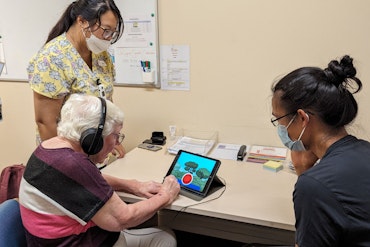Aged care quality could improve if allied health trainees receive financial assistance
Eligible nursing students will soon receive financial assistance during placements, but allied health students are being left behind
![<p>Trainee nurses will receive government-funded support, but allied health undergraduates are not eligible yet, despite their importance in aged care. [Source: Shutterstock]</p>](https://agedcareguide-assets.imgix.net/news/articles/wp/nursewoman2409.jpg?fm=pjpg&format=auto&w=550&q=65)
Trainee nurses will receive government-funded support, but allied health undergraduates are not eligible yet, despite their importance in aged care. [Source: Shutterstock]
Key points:
- Eligible nursing students can receive financial support during placements from July 1, 2025, an effort that may reduce the nursing shortage and improve aged care
- Australia may experience a nursing shortage of approximately full-time 70,700 nurses by 2035, according to the latest data from the Department of Health and Aged Care
- Health Services Union National Secretary Lloyd Williams expressed concern about the allied health sector being ‘left behind’ without placement funding support
The Australian Government will soon provide means-tested financial support for eligible trainee nurses completing their compulsory placements, which could aid in the current workforce shortages and improve aged care.
Up to 68,000 higher education students, such as trainee nurses, will be eligible to receive $319.50 dollars per week during clinical and professional placements from July 1, 2025.
While the national minimum wage is currently $915.90 dollars per week for full-time workers, eligible nursing students will be more likely to continue their degree and eventually work as nurses in areas such as aged care homes.
Recent estimates suggest that Australia will face a nursing shortage of approximately 70,700 full-time nurses by 2035.
However, the extra financial support during placements may encourage more students to complete their studies and become employed in areas such as aged care.
Approximately 464,200 registered and enrolled nurses practice in Australia, according to the latest data from the Nursing and Midwifery Board of Australia.
When the financial placement support was announced, Minister for Education Jason Clare highlighted the positive impact that it would have on students aspiring to help others through their work.
“This [financial support] will give people who have signed up to do some of the most important jobs in this country a bit of extra help to get the qualifications they need,” he said.
“Placement poverty is a real thing. I have met students who told me they can afford to go to uni[versity], but they can’t afford to do the [practical placements].
“Some students say [a placement] means they have to give up their part-time job and that they don’t have the money to pay the bills.”
With Australia’s growing and ageing population, preventing a shortage of nurses means that quality aged care can be provided to older Australians.
Older Australians in aged care homes can expect to receive an average of 215 minutes of personal and nursing care from October 1, 2024. This involves assistance from healthcare workers such as registered nurses and personal care workers.
While typical roles of a nurse include administering medication and wound management, nurses working in aged care may find themselves helping with some other tasks. Unexpected nursing duties may include: counselling, advocacy for older Australians and assisting with manual handling.
However, nurses are not the only health professionals who help older Australians in aged care facilities.
Approximately 63 percent of Australians who enter aged care homes experience ‘at least mild symptoms of depression,’ highlighting the importance of psychologists and mental health professionals.
Despite allied health workers providing essential care to older Australians, psychology students on placement are not yet eligible for placement financial support.
Health Services Union National Secretary Lloyd Williams highlighted that students training in allied health professions should receive the same financial support as nursing students on placements.
“While we welcome the Federal Government extending financial support to students enduring hardship on placement, we can’t fathom why allied health has been left behind,” he said.
“Workforce shortages across allied health are disrupting hospitals and outcomes for Australians using the NDIS and aged care systems. Barriers to study only make these worse.”
One Health Services Union member and clinical psychologist, Matteo, encouraged the government to provide financial support to students on allied health placements to prevent a workforce shortage.
“Clinical psychologists in training are studying for [a] minimum [of] six years before they are eligible to be paid as a psychologist,” he said.
“[…] I was unable to work with clinical endorsement until eight years of study.”
Over 38,000 registered nurses are currently employed in the Australian aged care industry, with 47 percent of these nurses working part-time hours, according to the latest data available from Jobs and Skills Australia.
What are other ways you think aged care could be improved?
Let the team at Talking Aged Care know on social media.
For more information and news in the aged care industry, subscribe to our free newsletter.
Relevant content:
One-of-a-kind gallery opens today, featuring artworks by artists with dementia
Aged care advocates say home care support wait times are ‘misleading’
Super contribution changes could improve 370,000 aged care workers’ retirement outcomes























